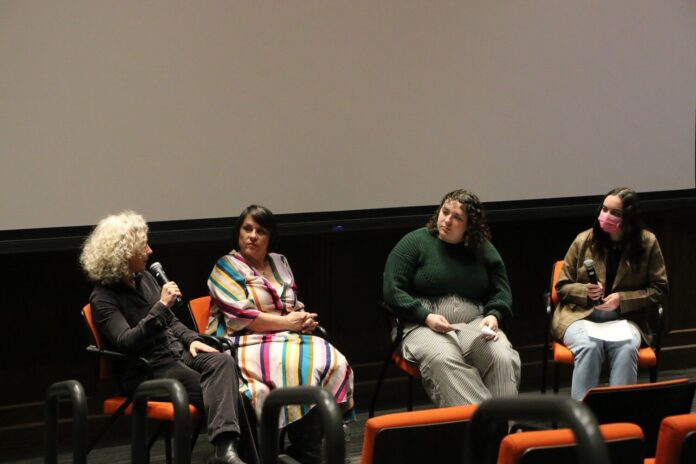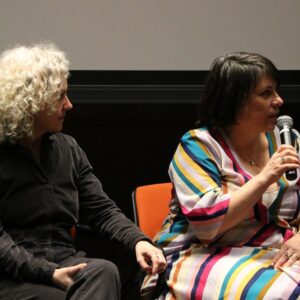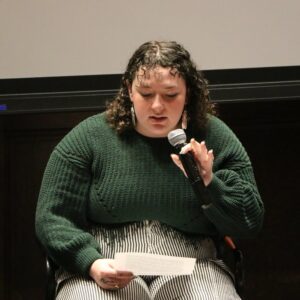
Content warning: This article contains discussions of sexual assault.
The Occidental community held a screening of the film “Body Parts” in collaboration with the Critical Theory & Social Justice, Media Arts & Culture (MAC) and Gender, Women, & Sexuality Studies departments, and the new Womxn in Cinema and Television club. Professor Allison de Fren, chair of the MAC department at Occidental, attended a screening of the film a few months before the March 29 screening.
“I think that the documentary is masterful not only in its coverage of a range of topics related to the treatment of the female body — from body doubles and digital de-aging/slimming to intimacy coordination (or lack thereof) and the #MeToo movement — but also the hundreds of Hollywood films it references in discussing the way sex and intimacy have been portrayed by the entertainment industry,” de Fren said. “That it was made during the pandemic is even more impressive.”
De Fren said she saw the importance of the film for future filmmakers in her department, as well as generally encouraging conversations about objectification and consent on and off the screen in the larger community. This coming Fall semester, the MAC department will be offering relevant courses titled “Female Filmmakers: Producing, Performing, and Screening Racial Identity“ and, as part of the “Humanities for Just Communities” curriculum, “Feminist Provocations: Migrant Justice in US Cinema.”
Director Kristy Guervara-Flanagan and producer Helen Hood Scheer premiered the film at the 2022 Tribeca Film Festival, after five years of work. Both are professors in Southern California — Flanagan at the University of California Los Angeles and Scheer at California State University Long Beach. After Flanagan’s short film “What Happened to Her,” about the cultural obsession with dead women on screen, the duo created this 90-minute documentary tracing the evolution of sex on-screen in mainstream American film and television.
“I think that we’re advocating for a plurality of people behind the camera,” Flanagan said.

According to Scheer, two of their biggest challenges were funding the film and finding celebrities who were willing to participate — among those in the film were Jane Fonda, Rose McGowan and Joey Soloway. The pair started filming before the emergence of the #MeToo movement and the Harvey Weinstein allegations, securing about 25 interviews before the pandemic hit, Scheer said. During the pandemic, Sheer said they followed the unfolding events in Hollywood and edited the interviews they had already conducted. Flanagan said they aimed to balance the difficult stories with those about people doing new, exciting things to give hope for the future.
“We were very careful of how we were going to replicate images like objectification or rape,” Flanagan said.
With cautiousness of the risk of re-objectification in showing clips from film and television, they worked to find different ways to show less nudity, including refracting scenes on camera lenses and animation, to distance the viewers, Flanagan said.
“Showing the process of consent in intimacy scenes is super important,” Scheer said.
Abigail Sajdak (sophomore), a co-president of the new Womxn in Cinema and Television club at Occidental, said she’s noticed the small number of women in her own MAC classes at Occidental.
“I think films like this are important because we’re talking about the topic of sex and the entertainment industry, and how women specifically are treated and are expected to act or show a certain amount of skin or act a certain way in order to find success,” Sajdak said. “I think it’s important that we recognize that it doesn’t have to be that way and we can work to change that culture.”

According to Sajdak, she and Sarah Cooke (junior) started the club hoping to provide a space for women in the male-dominated entertainment industry to come together to work on projects, share problems and build community.
“I hope we can start to think of ways, through the film and conversing with the director and producer, of how in the future we can work to create more safe spaces in entertainment and make sure that we respect peoples’ boundaries,” Sajdak said.
Contact Mollie Barnes at mbarnes@oxy.edu.
Correction April 6 at 7:22 p.m.: Updated to reflect the correct spelling of Sarah Cooke’s last name and that she is a junior.
![]()






























